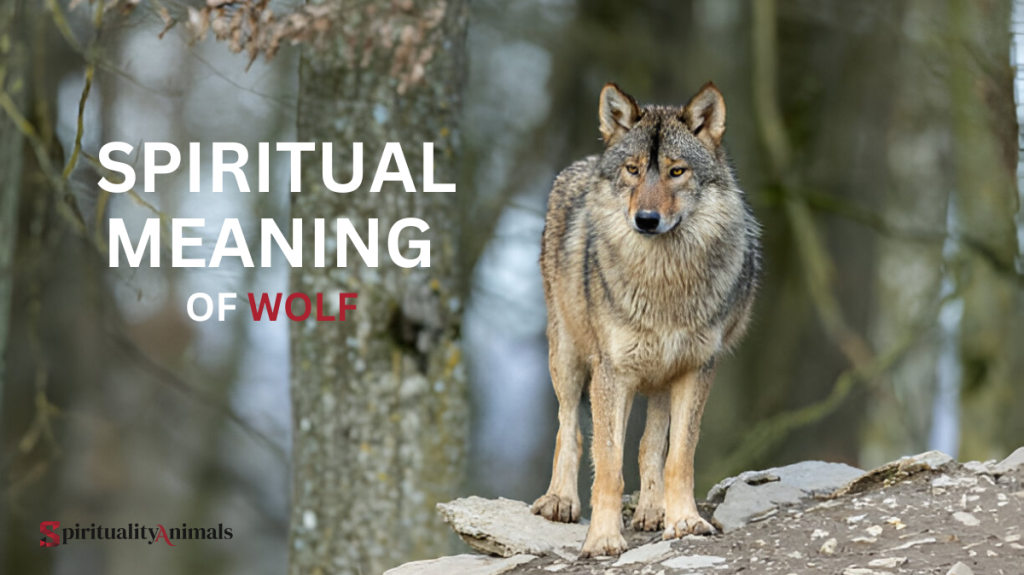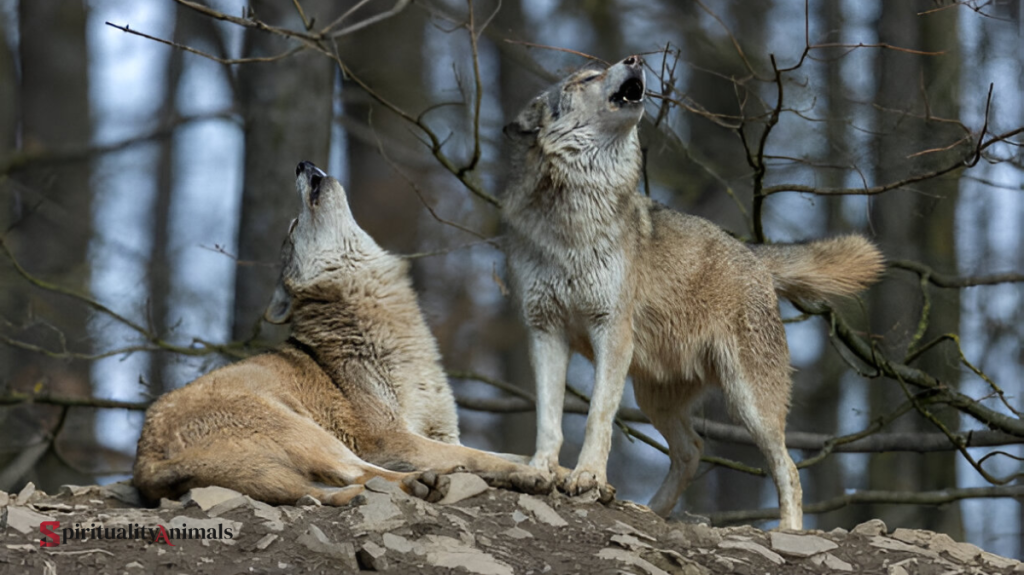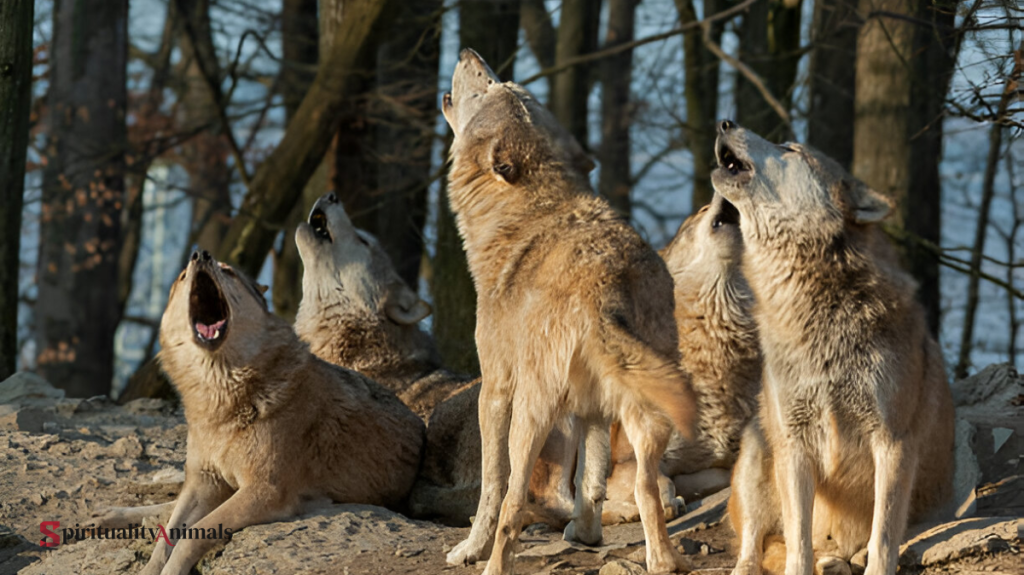Wolves have captured human imagination for thousands of years. These wild animals live in packs and are known for their howls, strength, and family bonds. People from all over the world have seen special meanings in wolves.
They appear in stories, art, and spiritual beliefs across many cultures. We will explore what wolves mean to people spiritually and what we can learn from these amazing animals.

Contents
- 1 Brief Answer on Spiritual Meaning of Wolf
- 2 Overview of Wolf Symbolism
- 3 Importance of Wolf in Spirituality
- 4 Meaning and Messages of the Wolf
- 5 Types of Wolf and their Meaning
- 6 Historical Context of Wolves
- 7 Spiritual Signs of the Wolf
- 8 Spiritual Characteristics of the Wolf
- 9 Symbolism of the Wolf in Different Cultures
- 10 Positive Traits of the Wolf
- 11 Negative Traits of the Wolf
- 12 Lessons from the Wolf
- 13 The Wolf as a Power Animal
- 14 Christianity and the Symbolism of the Wolf
- 15 Totem or Spirit Animals
- 16 Dream Interpretation: Seeing a Wolf
- 17 Wolves in Mythology and Folklore
- 18 Wolves and Tattoos: Meanings Behind Wolf Ink
- 19 Conclusion
- 20 Frequently Asked Questions
Brief Answer on Spiritual Meaning of Wolf
The spiritual meaning of a wolf primarily centers on a balance between instinct, intuition, and a deep connection to both community and personal freedom.
It symbolizes a powerful guidance in trusting your inner wisdom and highlights the importance of social and familial bonds, while also embodying the strength of independence and the spirit of the wild.
Overview of Wolf Symbolism
When people think about wolves spiritually, they often see them as symbols of freedom, family, and instinct. Wolves are not just mammal– they represent ideas and feelings that humans connect with.
The way wolves hunt together, protect their young, and stay loyal to their pack teaches us about teamwork and family. Words that often appear alongside “wolf” in stories and beliefs include “loyal,” “wild,” “pack,” “moon,” “howl,” and “guardian.”
Importance of Wolf in Spirituality
Wolves hold a special place in spiritual beliefs because they show qualities humans admire. Many spiritual traditions see the wolf as a teacher or guide.
When a wolf appears in someone’s life – whether in real life, dreams, or as a feeling – it might be bringing an important message or lesson.
The wolf reminds us to trust our instincts, stay true to ourselves, and value our connections with family and friends. People who feel connected to wolf energy often feel stronger when facing challenges in life.
Meaning and Messages of the Wolf
Spiritual Messages from the Wolf
When the wolf appears in your life spiritually, it may be sharing these messages:
Trust your inner voice. Wolves have sharp instincts that keep them safe. They remind us to listen to our own inner knowing.
Value your pack. Wolves depend on their family group to survive. They teach us about the importance of our own support system.
Find balance between freedom and responsibility. Wolves are wild and free, but they also take care of their young and elderly. This balance is something humans can learn from.
Use your voice. The wolf’s howl travels for miles and connects the pack. This reminds us to speak our truth and express ourselves.
Types of Wolf and their Meaning
Different types of wolves carry slightly different spiritual meanings based on where they live and how they survive.
Eastern Wolf
Eastern wolves live in forests of North America. They symbolize adaptation and resourcefulness. These wolves have learned to live near human areas while staying hidden and safe. They remind us to be flexible when our world changes.
Arctic Wolf
The white Arctic wolf survives in one of the harshest places on Earth. It represents endurance, purity, and the ability to thrive in difficult conditions. Arctic wolves teach us to stay strong even when times are tough.
Japanese Wolf
The Japanese wolf, now extinct, was once viewed as a messenger of the mountain gods in Japan. It represents protection and the connection between humans and nature. In Japanese culture, wolf symbols were used to guard against fire and theft.
Northwestern Wolf
The large Northwestern wolf stands for strength and leadership. These wolves maintain large territories and are known for their powerful presence. They remind us to stand tall and be confident.
Mexican Wolf
The Mexican wolf, one of the rarest wolf types, symbolizes resilience and survival against the odds. Nearly extinct at one point, these wolves are making a comeback. They teach us about never giving up, even when things seem impossible.
Alexander Archipelago Wolf
This wolf from the islands of Alaska represents independence and resourcefulness. Living on islands required these wolves to adapt their hunting and living habits. They remind us to be creative when solving problems.
Indian Wolf
The Indian wolf symbolizes cleverness and adaptability in harsh conditions. These wolves survive in hot, dry areas where food can be scarce. They teach us to use our minds to overcome challenges.

Historical Context of Wolves
Wolves in Ancient Civilizations
Thousands of years ago, many cultures looked up to wolves. In Ancient Rome, the story of Romulus and Remus told of twin boys raised by a wolf who later founded Rome. This made the wolf a mother figure and protector.
In Norse mythology, great wolves like Fenrir were powerful beings connected to gods. The Vikings respected the wolf’s strength and sometimes called their warriors “wolf-coats.”
Ancient Egypt had the wolf-god Wepwawet, who was a guide and opener of ways. His name actually meant “opener of roads,” showing how wolves were seen as guides through difficult journeys.
Spiritual Signs of the Wolf
When You Encounter a Wolf Spiritually
People might experience the wolf spirit in different ways:
- Seeing wolves repeatedly in dreams could mean your instincts are trying to tell you something important.
- Feeling drawn to wolves or wolf images might suggest the wolf is becoming a spiritual helper for you.
- Hearing a wolf howl when none is present could be a spiritual message calling you to express yourself more honestly.
- Finding wolf tracks unexpectedly might represent a path you should follow.
- These signs often appear during times of change or when you need guidance.
Spiritual Characteristics of the Wolf
Traits of the Wolf Spirit
The wolf spirit carries many qualities that inspire us:
- Loyalty: Wolves mate for life and stay committed to their pack.
- Intelligence: Wolves use smart hunting strategies and solve problems together.
- Communication: Through howls, body language, and facial expressions, wolves share complex messages.
- Balance: Wolves know when to be fierce and when to be gentle with their pups.
- Freedom: Wolves represent the wild spirit that cannot be tamed or controlled.
- Intuition: Wolves sense danger and opportunity using all their senses.
Symbolism of the Wolf in Different Cultures
Wolves in Native American Culture
Many Native American tribes see the wolf as a teacher and guide. The Pawnee tribe calls themselves “Wolf People,” showing their respect for the animal’s hunting skills.
The Shoshone believe wolves were created to help humans learn about family and cooperation. Wolf ceremonies help teach young people about responsibility to the community.
Some tribes see the wolf as a medicine animal with healing powers. The wolf’s knowledge of plants and survival was considered valuable wisdom.
Wolves in Greek and Roman Mythology
In Greek mythology, Apollo, the god of light, was sometimes connected to wolves. The Greek word for wolf, “lukos,” is related to the word for light.
Romans told the story of the she-wolf who nursed Romulus and Remus, the founders of Rome. This made the wolf a symbol of motherhood and the birth of their civilization.
Wolves were also connected to the god of war, showing how people admired the wolf’s courage in battle.
Positive Traits of the Wolf
What Good Qualities Does the Wolf Represent?
The wolf carries many positive meanings:
- Family devotion: Wolves care for the young, old, and injured members of their pack.
- Teamwork: Hunting large animals requires wolves to work together perfectly.
- Endurance: Wolves can travel up to 100 miles in a day when needed.
- Teaching: Adult wolves patiently teach their pups hunting and social skills.
- Freedom: The wolf represents living according to your own nature rather than others’ expectations.
Negative Traits of the Wolf
The Dark Side of the Wolf Spirit
Like all symbols, the wolf has challenging aspects too:
- Aggression: Wolves can be fierce when threatened, reminding us to watch our anger.
- Territory issues: Wolves defend their land strongly, which can represent being too protective of what’s “ours.”
- Fear of the unknown: Many human fears about wolves came from not understanding them, teaching us to look beyond our fears.
- Isolation: A lone wolf separated from its pack faces many dangers, showing the risks of cutting ourselves off from support.
Lessons from the Wolf
What Can We Learn from Wolves?
Wolves offer important teachings for our lives:
- Balance freedom with responsibility. Wolves run free but always return to care for the pack.
- Use all your senses. Wolves stay alert by using smell, hearing, sight, touch, and taste to understand their world.
- Rest when needed. Wolves conserve energy and play when they can, teaching us about work-life balance.
- Communicate clearly. Wolf howls, growls, and body positions all have specific meanings, showing the importance of honest expression.

The Wolf as a Power Animal
What is a Power Animal?
A power animal is a spirit helper in the form of an animal that lends its strengths and qualities to a person. These helpers appear in many spiritual traditions around the world.
How the Wolf Can Be Your Power Animal
If the wolf is your power animal, you might:
Feel drawn to protect others and value family strongly Have good instincts about people and situations Need freedom and space to be yourself Be a natural teacher or guide for others Feel comfortable in leadership roles when necessary
People connect with their wolf power animal through meditation, dreams, and spending time in nature.
Christianity and the Symbolism of the Wolf
The Wolf in Christian Symbolism
In early Christianity, wolves often represented dangers to the faith. Jesus spoke of “wolves in sheep’s clothing,” warning about those who appeared good but had harmful intentions.
However, some Christian stories show wolves being tamed by saints like St. Francis of Assisi, representing how faith can transform even the wildest nature.
Later Christian traditions sometimes used the wolf to represent the Devil or temptation, though this view has changed in modern times as people learn more about real wolves.
Totem or Spirit Animals
What is a Wolf Totem?
A wolf totem is a spiritual symbol that represents the protective power of the wolf. People who connect with the wolf totem often feel its energy helping them in challenging times.
How to Connect with Your Wolf Totem
To build a relationship with your wolf totem:
- Learn about real wolves and their behavior
- Spend time in nature, especially in places wolves live
- Keep a dream journal and note when wolves appear
- Create art or music inspired by wolves
- Find quiet times to listen for the wisdom of your wolf spirit
Dream Interpretation: Seeing a Wolf
What Does it Mean to Dream of a Wolf?
Dreams about wolves can have different meanings:
A friendly wolf might represent a guide or helper appearing in your life. Being chased by a wolf could mean you’re running from a challenge you should face.
A wolf pack might symbolize your need for community and support. A howling wolf could represent your own voice waiting to be heard. Wolf pups in dreams often connect to new beginnings or creative ideas.
The feeling you have during the dream is just as important as what the wolf is doing.
Wolves in Mythology and Folklore
The Wolf in Popular Myths
Wolves appear in countless stories across cultures:
The Big Bad Wolf from Little Red Riding Hood and The Three Little Pigs shows fears about the unknown dangers of the forest.
Werewolf legends speak to human fears about losing control of our “animal nature.”
The wolf Fenrir from Norse mythology was so powerful even the gods feared him, showing respect for the wolf’s strength.
Famous Folklore About Wolves
Many folk tales feature wolves:
In Russian folklore, the wolf is often clever and helps human heroes complete impossible tasks.
Some European stories tell of wolves that lead lost travelers to safety, showing the wolf as a guide.
The Native American tale of “The Wolf Who Wanted to be a Man” teaches about accepting your true nature.
Wolves and Tattoos: Meanings Behind Wolf Ink
Why People Get Wolf Tattoos
Wolf tattoos are popular because they represent powerful qualities:
A howling wolf might symbolize finding your voice and speaking your truth A wolf with its pack represents family bonds and loyalty A lone wolf can stand for independence and self-reliance A wolf with the moon connects to intuition and the mysterious parts of life
People choose wolf tattoos to remind themselves of their own inner strength and wildness.
Conclusion
The wolf carries deep spiritual meaning across cultures and throughout history. These amazing animals teach us about family, freedom, instinct, and finding our own path.
Whether appearing in dreams, art, stories, or as a feeling of connection, the wolf reminds us of our own wild nature and the importance of balance in life.
When we learn from the wolf, we remember to trust ourselves, value our relationships, and find courage to face challenges.
The spiritual meaning of wolf continues to inspire people today, helping us reconnect with nature and our own inner wisdom.
Frequently Asked Questions
What does it mean if I feel connected to wolves?
Feeling connected to wolves might mean you value family, freedom, and trusting your instincts. It could suggest you have leadership qualities and protect those you care about.
Are wolves good or bad spiritual symbols?
Wolves are neither good nor bad – they represent natural energy that can be helpful when understood properly. Different cultures view wolf symbolism differently.
What should I do if I dream about wolves often?
Pay attention to how you feel in the dreams and what the wolves are doing. Keep a dream journal and look for patterns. Your dreams might be telling you to trust your instincts more.
Can wolves be spirit guides?
Yes, in many traditions wolves serve as spirit guides that offer protection, wisdom about family and community, and help with finding your path in life.
Do different colored wolves have different meanings?
Yes, white wolves often represent purity and spiritual guidance, black wolves can symbolize protection and mystery, and gray wolves typically connect to balance and wisdom.
Disclaimer: At SpiritualityAnimals, we share spiritual and symbolic interpretations based on traditional wisdom and personal insights. Our content is purely informational and should not replace professional guidance.
